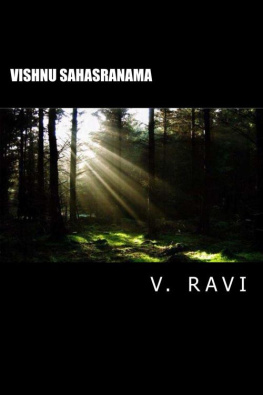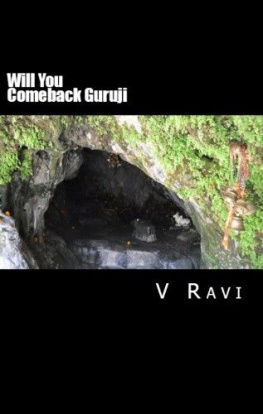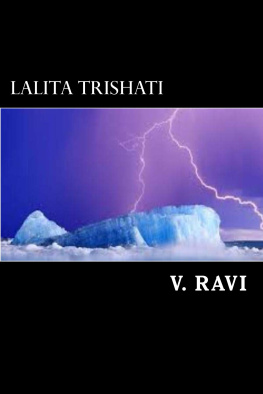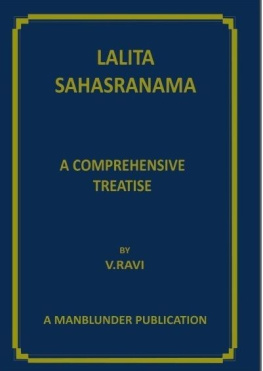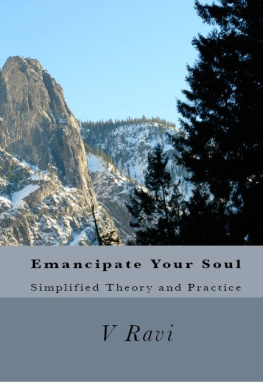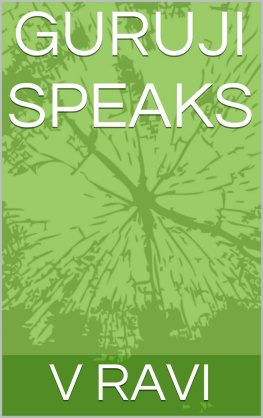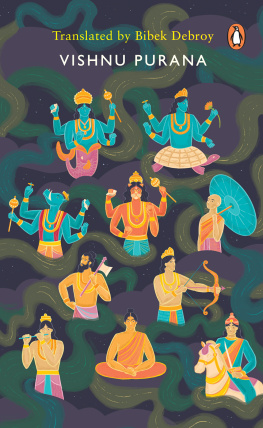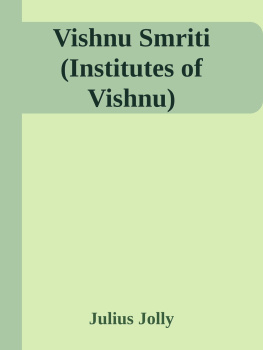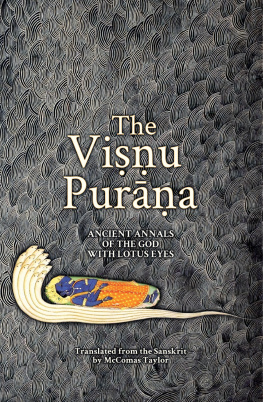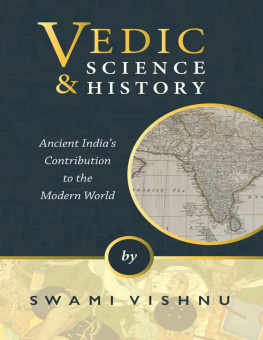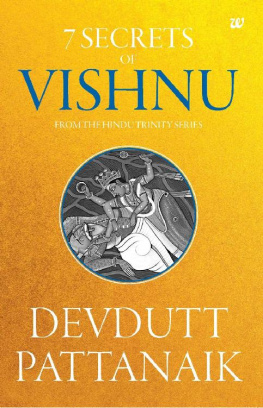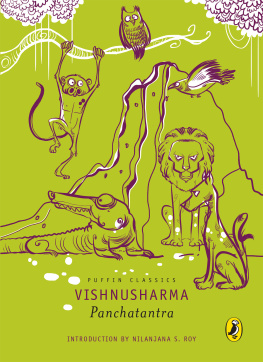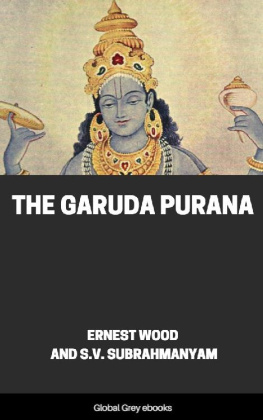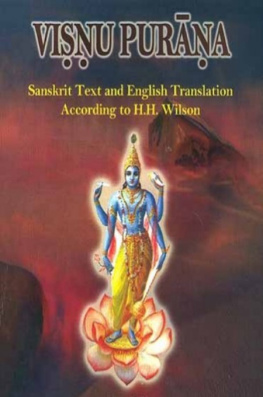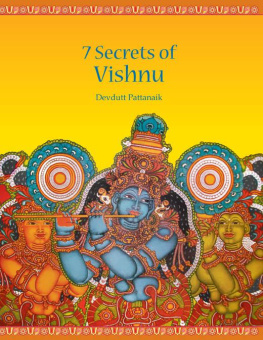VISHNU SAHASRANMA
VIU SAHASRANMA
A COMPREHENSIVE TREATISE
BY
V. RAVI
MANBLUNDER PUBLICATIONS
Copyright with the author
All rights reserved. No part of this book may be reproduced, stored in retrieval system or transmitted, in any form or by any means, electronic, mechanical, photocopying, recording or otherwise without the written permission from the author, except for brief passages quoted in reviews or critical articles.
Date of publication: November 28, 2012
Published by:
Manblunder publications
Chennai, India.
Web: www.manblunder.com
Email:
PREFACE
Viu means all pervading. Viu is the administrator of the universe. He puts in place, the laws of the universe and administers the universe strictly according to the law. He is a strict disciplinarian, yet highly compassionate in nature. He presides over all the seven planes of the universe. The abode of Viu is supposed to be the Supreme one. He has prescribed various paths through which one has to travel to reach His abode, the point of no return for a soul, known as liberation. He has been referred to in Vedas. Without Viu, no fire ritual is complete. He is quite often referred to as Purua, the Supreme Soul. His famous sleeping posture on Ananta, the snake, who floats on the ocean of milk, is very well known. This posture is not merely a gross description, but has got subtle meaning. Ananta means infinite and the milk of ocean refers to the eternal bliss. He lies in the ocean of eternal bliss. Those who seek Him also enter the state of bliss at some point of time. He incarnates in different forms to destroy evil doers. His avatars occur whenever there is imbalance between morality and immorality. When immorality begins to dominate over morality He incarnates. His notable incarnations are Lord Rma and Lord Ka.
The scene of unfolding this great Sahasranma happened in the great epic Mahbhrata authored by sage, Veda Vysa. Bhma was lying on a bed made of arrows awaiting his death. At that time, he was meditating on Ka. Knowing this, Ka asked Yudhihira (eldest among Pava brothers and known for his righteousness) to seek spiritual initiation from Bhma and also told Bhma to initiate Yudhihira. Yudhihira asks Bhma kimeka daivata loke meaning who is the Supreme Lord of the world. Bhma replies by saying, that the purest, the most auspicious, the chief among the gods and the father of all the beings is the One who is Supreme, referring to Lord Viu. This conversation appears in the prvabhg of this Sahasranma. The spiritual initiation of Yudhihira by Bhma is Viu Sahasranma. Ka was also present when this happened and this Sahasranma was blessed by the Lord Himself.
Viu is also known as Nryaa. Garua Pura (III.24.54, 55) explains the etymological meaning of Nryaa. As He is the resort of merits and demerits and as He abides in the waters of ocean, He is called Nryaa. Water is also called nra (probably meaning cosmic water); as His Abode is water, He is called Nryaa. Viu is the most auspicious form of the Brahman. He is not only invoked during auspicious occasions, but also while performing funeral rites. At the time of conclusion of all rituals, the effect of the rituals are surrendered to Viu.
Viu Sahasranma consists of three parts prvabhg or the first part; stotrabhg or the main part from which one thousand names or nma-s are composed; and uttarabhg or the concluding part. The main part consists of 108 couplets from which all the 1000 nma-s are derived. Apart from these three parts, this Sahasranma has seven dhyna verses by which one can meditate upon His auspicious form.
All the one thousand nma-s have been interpreted based on ancient Scriptures like Upaniad-s. Wherever possible, quotation from Upaniad-s and other Scriptures have been used. Many of the nma-s are interpreted from the point of view of attaining Him to get liberation. Wherever needed, Sanskrit verses have been used along with IAST, for the sake of proper pronunciation.
V. RAVI
CHENNAI, INDIA
NOVEMBER 28, 2012
PRVABHGA
Viu Sahasranma begins with Prvabhga or the prologue. This part consists of twenty one verses, mostly in the form of invoking Lord Vius blessings and expounding His greatness. This part is in the form of conversation between Yudhihira and Bhma.
I meditate upon the One, who appears in pure white dress, shines like the full moon, the One with four hands, whose eternal bliss is reflected through His face, for removing any obstacles. I pay obeisance to the great impeccable sage Vysa, the great grandson of sage Vasiha, grandson of sage akti (the eldest of Vasiha's hundred sons) and the son of sage Parara. I pay obeisance to the Lord Viu, who is in the form of Vysa and to the sage Vysa in the form of Lord Viu, who is the treasure of Vedas. I pay obeisance to Vysa, who is in the linage of sage Vasiha. (The inseparability between the devotee and the Lord is highlighted here.)
I bow my head in reverence to the Supreme Lord Viu, who is without modifications, pure, eternal, changeless and the Supreme Conqueror. I prostrate before the mighty One, whose mere contemplation ceases the pains of transmigration.
Vaiampyana said, (Vaiampyana is a pupil of Vysa and also the narrator of the Mahbhrata to Janamejaya, a celebrated king) After having listened to the means to renounce dharma and the ways to annihilate sins, Yudhihira again addressed Bhma.
Yudhihira asked, Who is the unified Lord of the universe? Which is the ultimate refuge? By worshipping whom, the humanity attains propitiousness? Which is the best of all dharmas? Having born, what is the way to liberation?
Bhma said, By worshipping Lord Viu, the Lord of the universe, the Chief of all gods, the One who is Infinite, the One who witnesses from Above, through devotion and perseverance with His one thousand nma-s (names) and worshipping and praising That Purua (the Brahman or the Supreme Self), by means of meditation, praise and prostration, one gets rid of all his pains and miseries. The one who worships Him, who is fond of Vedas, Knower of all righteousness, who strives for the upliftment of the world, the Chief of the universe, the Almighty, the One who causes birth and death, is relieved of his sufferings.
Worshipping Lord Puarikka (lotus eyed, referring to Lord Viu) all the time with devotion and through verses in His praise, is considered as the supreme amongst all dharmas. That which is the Supreme light, the Supreme penance and the Supreme Brahman is the Supreme Abode. The Purest amongst the pure, the most Auspicious amongst the auspiciousness, the Lord amongst the gods and the eternal Creator, He alone is the Lord of the universe.
From whom the entire creation originates and dissolves, the One who is the upholder of the universe and Omnipresent, His one thousand nma-s are capable of eradicating sins and fearfulnesses. Listen to me for those celebrated nma-s that describe His gua-s (attributes) and versified by great sages and saints. I am declaring these nma-s to you, for your enlightenment.
For this Sahasranma, Veda Vysa is the i (the sage by whom this Sahasranma was revealed to the world) and the son of Devaki, Lord Viu in the form of Ka is Devata.
I prostrate before the Omnipresent, the in dweller of all the beings, the great Lord, who has innumerable forms, the destroyer of demons, ever radiating Puruottama (the highest being), the Lord Viu.
DHYNA VERSES
- - -
- - -
- - - - - -
- - - - - (1)
krodanvatpradee uci-mai-vilasat-saikate mauktikn
mlkluptsanastha-spaikamainibhai-maurtikai-maitga
ubhrai-rabhrai-radabhrai-rupariviracitair-mukta-puya-
varai
nand na puny-dari-nalina-gad-aakhapir-mukunda ||
Prayers to Lord Mukunda, having discuss, mace, conch and lotus in His hands, seated in a throne decked with garlands of pearls in the Ocean of Milk, the shore of which is made up of precious stones, whose body is adorned with transparent pearls, feeling the ecstasy of the pure white clouds above sprinkling the nectar of bliss, to cleanse us of our sins.
Next page
